Seed for Change Student Grant Competition
Past Winners and Finalists
2025
Winner: “The Paal”
Manali Jain, Master’s in Public Policy ’25, Harvard Kennedy School
The Paal is a platform that is turning livestock into an investable asset class to improve livelihoods for smallholder women farmers. It aims to transform livestock ownership through an innovative model that de-risks the process for farmers by channeling retail investments and tapping into the momentum of India’s growing economy. The model is designed to improve the incomes of smallholder women farmers, often excluded from India’s growth story, by equipping them with the tools and support they need to thrive.

Runner-Up: “Games for Ed”
Mridula Chalamalasetti, Master’s in Education ’25, Harvard Graduate School of Education
Games For Ed aims to enhance student engagement through game-based experiential learning. The program develops custom curriculum-aligned games and thematic mega-games, focusing on diverse topics like sustainability and global trade. By partnering with schools, it supports teachers with training and resources, ensuring accessibility for low-income institutions through a revenue-sharing model. With this approach, Games For Ed seeks to integrate playful learning into mainstream education.

2024
Winner: “Solara”
Rea Savla, MBA ’24, Harvard Business School
“Solara” aims to eliminate farmers’ dependence on costly, fossil-fuel-based irrigation methods. It will pilot an on-demand solar irrigation service for Indian farmers in Odisha, increasing their access to affordable, reliable, and clean irrigation. For this, “Solara” is deploying a network of solar irrigation kits that are shareable. Through a digital platform, farmers will be able to book time and pay for that time only, which can be thought of as an “Uber for Irrigation” in rural India. This relieves marginal farmers of the burden of owning costly solar irrigation equipment and instead offers them irrigation services only when and where they need it at half the price of traditional diesel-powered irrigation systems.
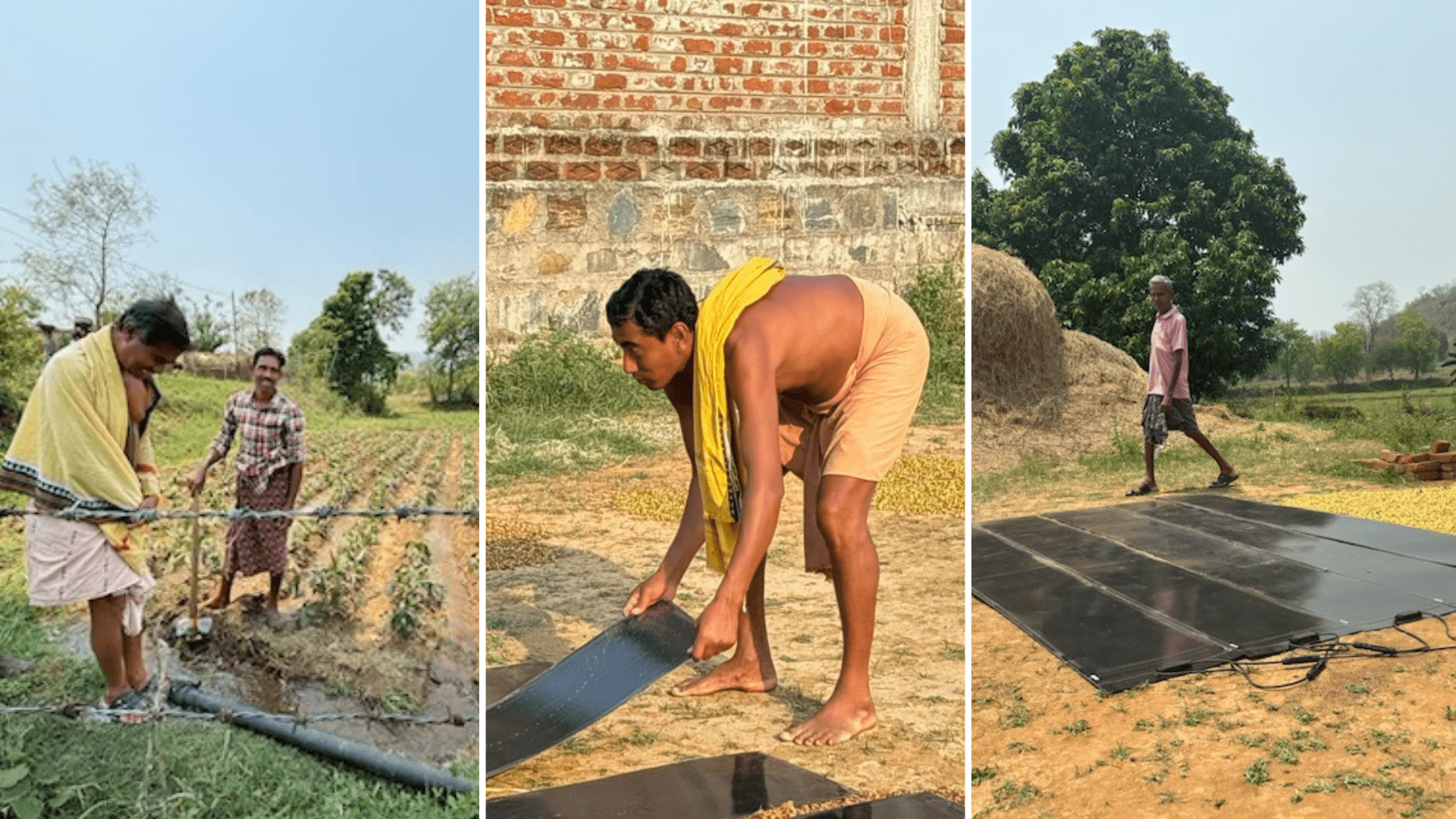
Runner-Up: “North Star Program”
Alria Kharage, Master of Education ’24, Harvard Graduate School of Education
Vyankatesh Kharage, Master of Education ’24, Harvard Graduate School of Education
Asude Foundations’ North Star Program is a comprehensive intervention designed to support students in Grades 9 and 10 by providing career education and building essential life skills. Students get the opportunity to explore their interests, develop essential skills, and receive the necessary support to make informed decisions about their future after Grade 10. With the grant, the program will expand from Chhatrapati Sambhajinagar (formerly Aurangabad) to a new district in the state of Maharashtra by partnering with local grassroots NGOs.
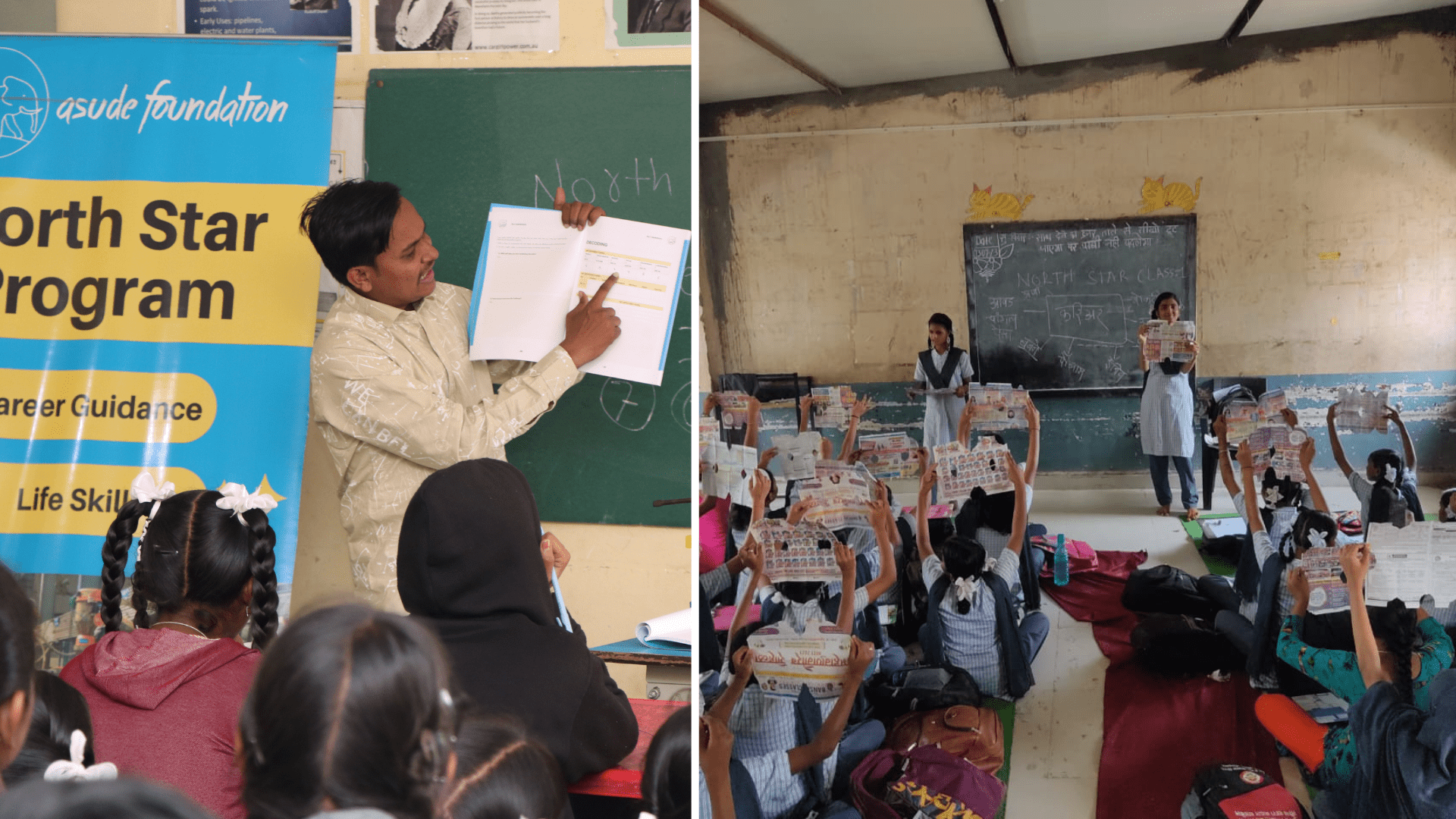
2022
Winner (India): “e-Rehri“
Gauri Nagpal, Graduate School of Design, Class of 2023
e-Rehri is working towards providing affordable, electric and modular carts for street vendors in Indian cities, making the daily delivery of fresh produce efficient for both the vendors and consumers alike. Electric vehicle technology is retrofitted to traditional Indian street carts, creating an incremental and affordable transition to green energy. Using this method, any existing cart can be transformed into an electric vehicle while retaining its ability to function as a mechanical tricycle cart. Read more.
Winner (India): “Rehnuma”
Jonathan Frank Mendonca, Graduate School of Education, Class of 2022
Rehnuma works with motivated school principals to find simple ways that improve the quality of education in under-resourced schools by using limited resources effectively and leveraging their community. Rehnuma documents these sustainable best practices into short courses and partners with large-scale NGOs, such as Teach for India, to coach and support principals from similar contexts as they implement these practices.
Winner (Pakistan) “Zhuu Fruits”
Nosher Ali Khan, Harvard College, Class of 2024
Zhuu Fruits is an agricultural-tech startup that facilitates logistics, branding, packaging and online retail to ensure farm-to-table service for fruits in Gilgit-Baltistan, Pakistan. Zhuu Fruits will be working with local farmers to ensure that their produce is compensated fairly, customers get the highest quality fresh fruit and there is minimal post-harvest loss.

e-Rehri is a 2022 Seed for Change grant recipient that is working towards providing affordable, electric, and modular carts for street vendors in Indian cities.
2020
In light of the pandemic, the Mittal Institute offered exploratory grants to students who were working on ideas or a project that addresses intractable problems in India and Pakistan. The projects below were awarded a small grant. Learn more about each project here.
In India:
COVID-19 Misinformation Project – Sahana Bail, Kanishk Mittal
Narrowing Information Gaps Across India’s Higher Education System – Aman Panjwani
Earth Warriors: Early Childhood Education to Promote Sustainability – Keya Lamba, Shweta Bahri
GAMI: Global Alliance for Medical Innovation – Sreekar Mantena, Jay Chandra, Andrew Zhang, Annie Miall
Communitize: Skill Development Platform (later renamed to Growthosphere)– Malini Srikrishna, Will Dey
Sahayak – Ambika Malhortra, Aeshna Prasad
Building State Capability and Community Leadership in Meghalaya – Prateek Mittal, Rebecca Trupin
In Pakistan:
KamyabiTest: Assessment App – Isabel Macdonald
Education and Art Podcast – Geena Saleh
Macro Pakistani – Faiz Ahmed
Naqsha Nigar: Redefining Lahore’s Cultural Heritage – Asmer Asrar Safi, Hamid Nawaz, Hajra Malik, Ramsha Bilal

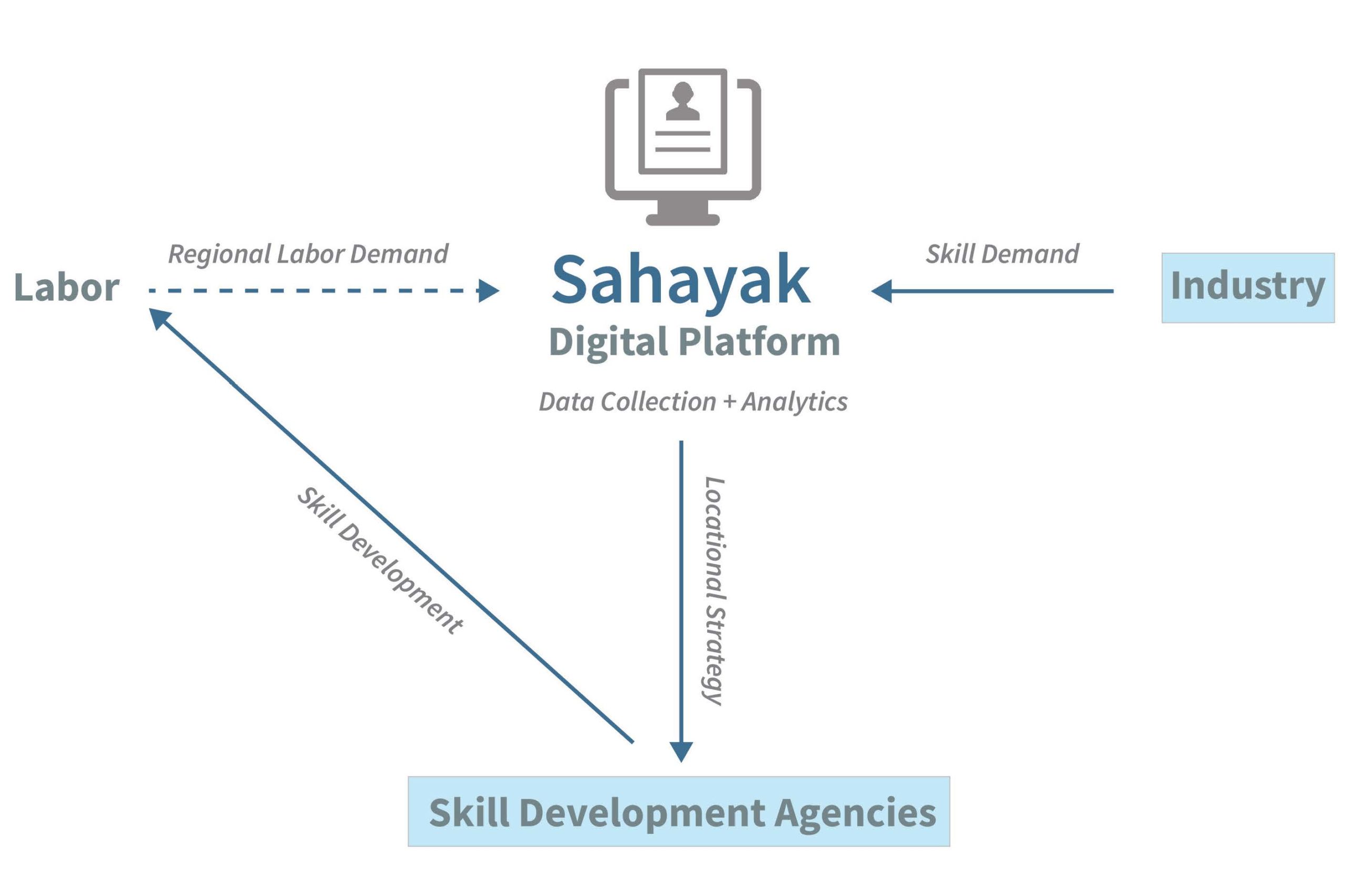
2019
Winner: “Gramhal”
Vikas Birhma, MPP ’19 at Harvard Kennedy School
Pankaj Mahalle, Tata Institute of Social Science, Mumbai
Gramhal is a social enterprise that builds smallholder farmers’ agency and increases their income by unlocking post-harvest services of storage, credit, and market linkage via a digital platform. Read more.
Runner–Up: “Riskboard”
Pradeepan Parthiban, ALM ’19 at Harvard and Tech + Human Rights researcher at Harvard Kennedy School
Ori Pleban, MPP ‘19 at Harvard Kennedy School
Arjun Bisen, MPP ’19 at Harvard Kennedy School
Ryan Jiang, BA ’20 at Harvard College
Riskboard is an app in development that will harness online data via social media and open source media data sites to monitor political risk and human rights abuses in India. Read more.
Runner–Up: “Meet”
Vish Srivastava, MDE ’19 at Harvard Graduate School of Design and Harvard John A. Paulson School of Engineering and Applied Sciences
Ankit Chugh, Medha, India
Meet is an employment app for India that connects verified employers and job-seekers, providing both with trusted information, such as reviews, job openings, and profiles to support better matching. Read more.
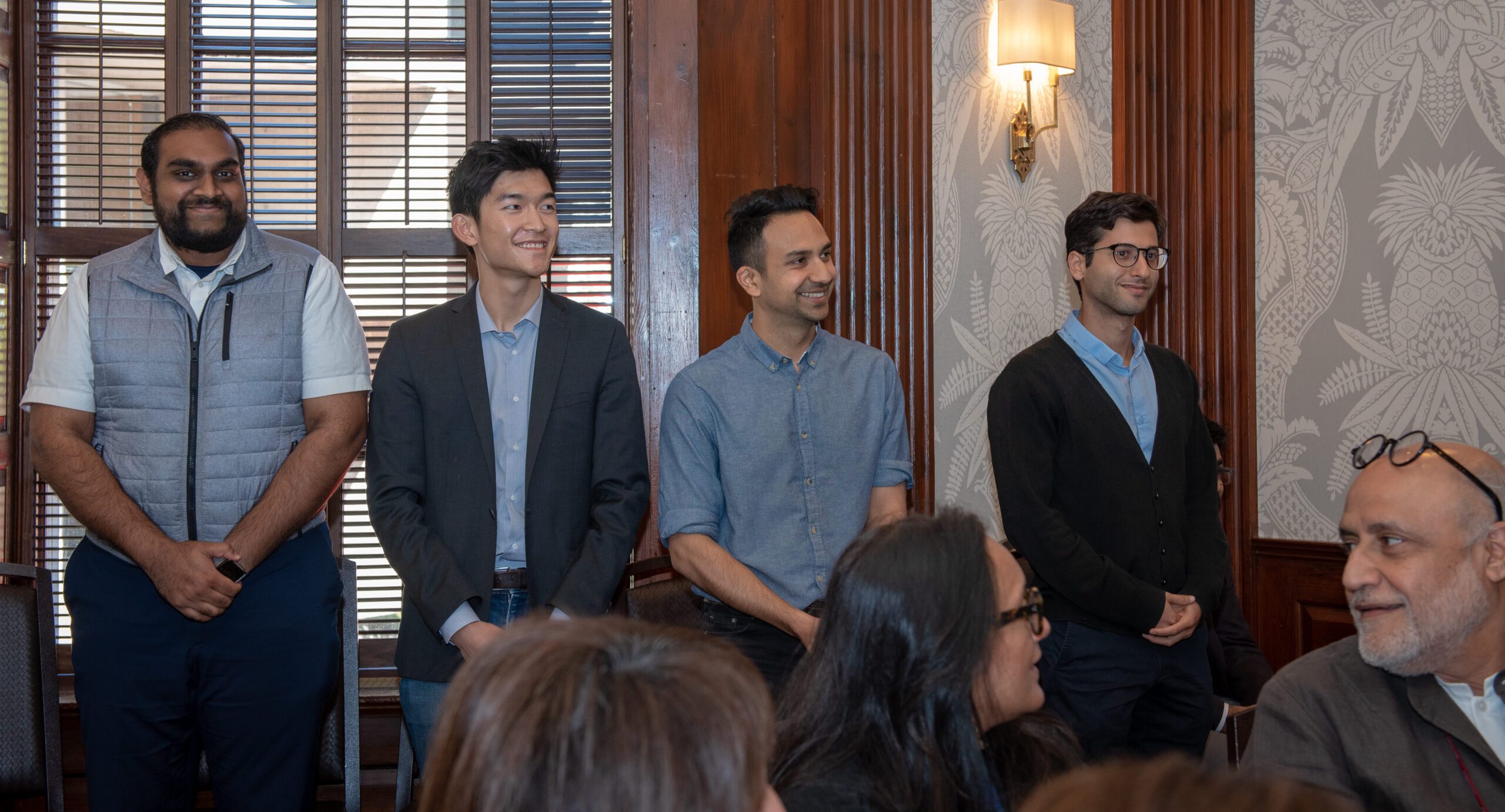
The four members of the Riskboard team are announced runners-up at the annual Seed for Change competition.
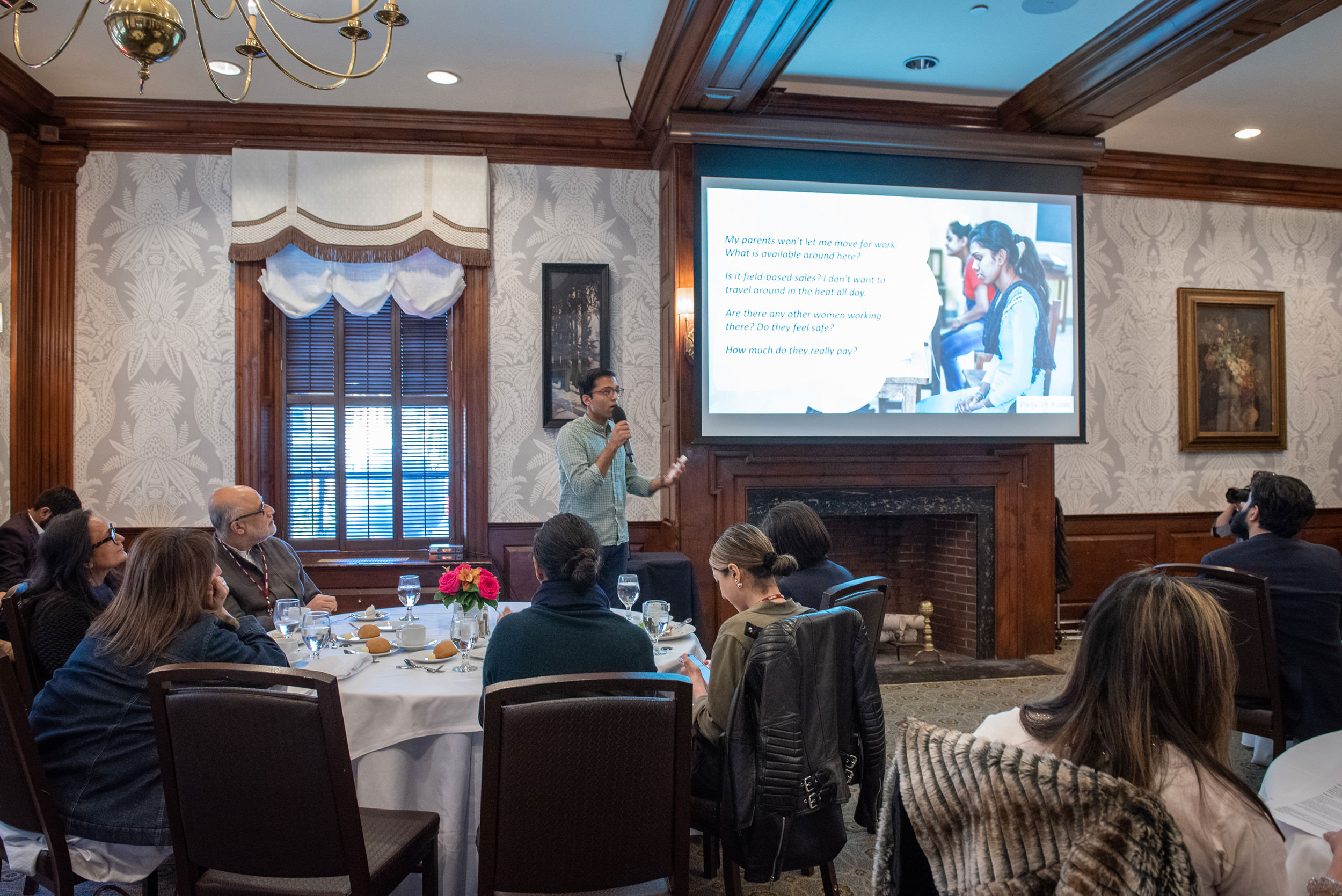
Vish Srivastava discusses the employment app Meet during the Mittal Institutes annual Seed for Change competition.
2018
Pakistan
Saving 9
Usama Javed Mirza, Saving 9, Co-founder and Program Manager
Muhammad Ovais Siddiqui, Saving 9, Co-founder and Program Finance Head
Zainab Zaheer, Saving 9, Program Coordinator and PR Head
Raissa Chughtai, Harvard College Class of 2021, Saving 9, Program Coordinator and Economic Analyst
Saving 9’s motto is ‘You don’t need to be a doctor to saves lives ‘, and the name of our organization comes from the idiom ‘A stitch in time saves 9’. We strongly believe that anyone can learn basic first aid, and hence gain the ability to support a casualty sufficiently during an emergency until they can reach the hospital. It is our organization’s mission to create a ‘safety net’ of first aid ‘literate’ citizens and robust emergency response systems. Our project is focused on creating an emergency response system in a rural village, Pind Begwal.
Xyal Water
Syed Waqar Ali Shah, Harvard Graduate School of Arts and Sciences, PhD Candidate in Mathematics
Iqra Nadeem, MIT, Master of Science Candidate in Technology and Policy Program
Diane Delava, Academics for Development LLN, CEO
Ali Mannan Tirmizi, Lahore University of Management Sciences Class of 2018
Xyla Water is a water filter company that builds filters based on plant tissues. The purification ability of xylem tissues was discovered and tested by Professor Karnik at MIT. We formed a research collaboration with him to commercialize and make a product out of this filter.
Umbulizer
The team is developing a reliable, low-cost, portable device that can provide continuous ventilation to patients in resource-limited settings in Pakistan.
India
Pre-Texts
Anshul Kumar, Harvard Graduate School of Arts and Sciences, PhD Candidate in Sociology
Jahnvi Singh, Pre-Texts Facilitator and Leaning Design Consultant
Polly Lauer, Research Coordinator for Pre-Texts
Pre-Texts is an effective and efficient pedagogy that acknowledges local strengths that can help promote development in literacy, innovation, and citizenship. The Pre-Texts protocol can raise literacy in low-resource communities thanks to local arts and languages that serve to interpret English language curricular material.
Parivartan
Alastair Fung, Master of Public Health Candidate in Global Health Candidate, Harvard T.H. Chan School of Public Health
Nithin Kondapuram, Master of Science Candidate in Epidemiology, Harvard T.H. Chan School of Public Health, and Research Assistant at Harvard Medical School,
Sujata Saunik, Takemi Fellow, Harvard T.H. Chan School of Public Health
Vivian Zhang, Master of Public Health Candidate, Harvard T.H. Chan School of Public Health
In India, rates of child diarrheal deaths continue to be alarmingly high despite overall improvements throughout the world. Treatment for often preventable cases of diarrheal illness is very costly for families in India, and more efforts should be made to promote behaviors that prevent the incidence of diarrhea in children. Hand washing with soap is a cost-effective means of preventing illnesses caused by bacterial contamination, as it decreases person-to-person transmission. However, India is one of the most water-challenged countries in the world. Project Parivartan aims to mitigate both the problems of water scarcity and the absence of hand hygiene practices by introducing alcohol-based hand sanitizer (ABHS) to 10 villages in the town of Palghar in Northern Maharashtra, a water-deprived tribal region of India. The use of ABHS as a substitute for hand washing provides a simple and cost-effective means of reducing the spread of diarrheal and respiratory diseases at schools in water-scarce areas.
Green Screen
A zero-electricity passive air cooling panel installed in urban slums, made entirely of agricultural waste. The team developed the idea in The Mittal Institute Director Professor Tarun Khanna’s class on Contemporary Developing Countries: Entrepreneurial Solutions to Intractable Problems. It is designed to be used in New Delhi, whose intense pollution and heat are interconnected problems, substantially attributed to the 27 million tonnes of agricultural waste annually burned outside the city, the smoke from which hangs over Delhi and traps in heat, producing the urban heat island effect on a massive scale. Learn more
2017
Winner: Sakhi
Sutopa Dasgupta, Ph.D. student, Harvard University
Andrew Powell; and Usha Venkatachallam
Sakhi is a social enterprise that provides an innovative, high-quality, low-cost, reusable, and environmentally-safe menstrual cup for women and girls in India, along with a gender and culture-sensitive menstrual health education and training program. Sakhi’s 360-degree approach addresses the significant challenges and taboos faced by the world’s largest menstruating youth population—116 million girls ages 15-24—and the world’s second largest menstruating female population—358 million women between ages 15-54. Sakhi’s team and strategy prioritizes local entrepreneurship and self-sustainability; culture, religion, and gender sensitivity to create positive social norms; and attention to health safety, sanitary practices, infrastructure challenges, and environmental sustainability. Sakhi’s unique medical-silicone sterilizer case with menstrual cup is a one-of-a-kind solution, custom-designed for Sakhi’s demographic that includes married millennials, young mothers, working women, and athletes. Seed for Change’s one-time investment and Sakhi’s community reinvestment strategy will yield project sustainability over the first three years and profitability in subsequent years. Seed for Change’s valuable support will enable Sakhi to incubate the social enterprise to help Indian girls and women eager for an affordable, portable, safe, and hygienic market-based solution to manage their monthly menstruation cycle with dignity, safety, and confidence. Learn more
Finalist: Anantara
Aaron Mendonca, Harvard Graduate School of Design
Prathima Muniyappa, Harvard Graduate School of Design
Prabhat Kumar
Elena Mechik
Anantara is a not-for-profit design collective working at the intersection of forest conservation through livelihood creation. By working with forest communities and their emerging small forest enterprises, they seek to convert collector economies into craftsmen communities through design. The focus is on sustainable harvesting and the creation of new value chains and value-added facilities within forest communities, to provide year-round employment opportunity through environmentally reinforcing activities. Forest degradation is linked to unsustainable harvesting, which is a result of acute poverty. Such practices threaten to erode indigenous cultural knowledge that has accrued over centuries as the forest communities stewarded their ecosystems. There are several NGOs and support institutions actively working to address the issues of forest conservation through sustainable harvesting and livelihood creation, but they have been largely unsuccessful across two major verticals: design development and market linkages. Anantara seeks to bridge this gap by providing branding, product design services, and a marketing platform. They will create value for the support institutions by increasing efficacy of their livelihoods program, and create value for the small forest enterprise by improving their products and providing a market for the same; thus, empowering forest communities to better steward their ecosystems.
Finalist: Barakat Bundle
Karima Ladhani, Harvard School of Public Health
Nayab Ahmad, Harvard College ’15
Dr. Jyoti Ramakrishna, Harvard School of Public Health
Amanda Hahnel
Barakat Bundle is a nonprofit providing lifesaving bundles to mothers and newborns in South Asia. They package together demand-inducing newborn essentials—such as baby clothes—as well as low-cost, evidence-based public health items—such as clean delivery kits for safe births. They provide them to low-income mothers for the birth of their first child. The medical items in the bundle specifically target causes of maternal and infant mortality and morbidities in targeted regions. The desirable goods incentivize demand for the bundle, encouraging utilization, and some also address cognitive development. Barakat Bundle integrates seamlessly into existing community health worker and health system infrastructure creating a framework for sustainable delivery. For more information, visit barakatbundle.org.
2016 Seed for Change Finalists
- GoMango: provides low-cost refrigerated transport to food producers in India.
- Torr Energy: for-profit company that uses a series of technologies and a unique model to produce and sell low-cost waste-derived solid fuel in remote areas.
- The Craftsmen: small forest enterprise facilitator that creates new value chains, provides year-round employment, and trains communities in sustainable harvesting practices.
Watch the finalist presentations here.
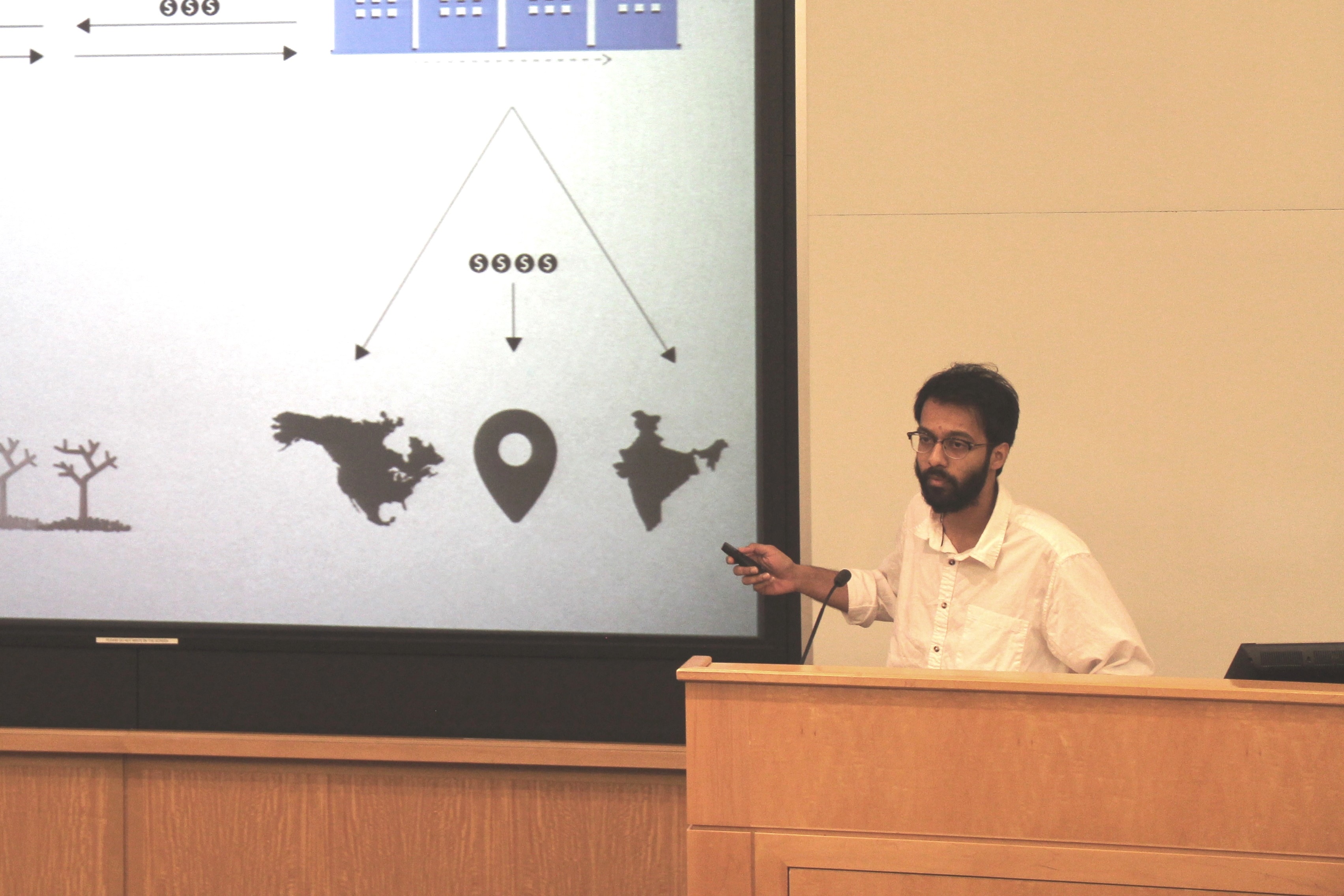
Aaron David Mendonca presents at the Seed For Change initial pitch event in March 2016.
Other student stories
Champion for India’s Girls: Priya Shankar, MPH ’16, is launching a peer education program to help girls live healthy lives
Alum Q+A: Saving the environment and improving women’s lives, one pad at a time: Saathi, founded by several MIT and Harvard graduates, has developed an eco-friendly sanitary pad made from local banana fiber that is fully compostable and bio-degradable. They hope it will give women more freedom in India and other developing countries.
- Alum Q+A: Saving lives at birth: Sabeena Jalal, an alum of the Harvard T. H. Chan School of Public Health and currently based in Karachi, has developed a blade to be used by midwives during childbirth to cut the umbilical cord. The blade does not get infected, so she hopes the tool can reduce the rate of infant mortality in developing countries.
- Alum Q+A: A new model for education: Taktse International School is a not-for-profit coeducational school located in the foothills of the Indian Himalayas, near Gangtok, Sikkim, India. The school encourages creativity and innovation among students, with a goal of “producing the compassionate and ethical leaders that developing societies so desperately need.”
- Alum Q+A: Using entrepreneurship to impact education in Pakistan: “When you take the first step, the landscape changes and you see opportunities instead of challenges,” says Imran Sarwar, Harvard Kennedy School alum, about entrepreneurship. Sarwar is the co-founder of Rabtt, which aims to change the education landscape in Pakistan.
